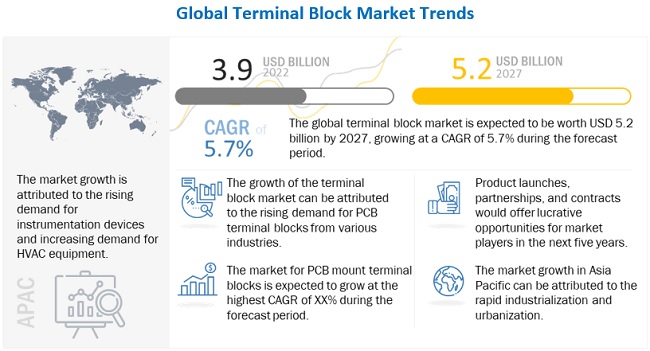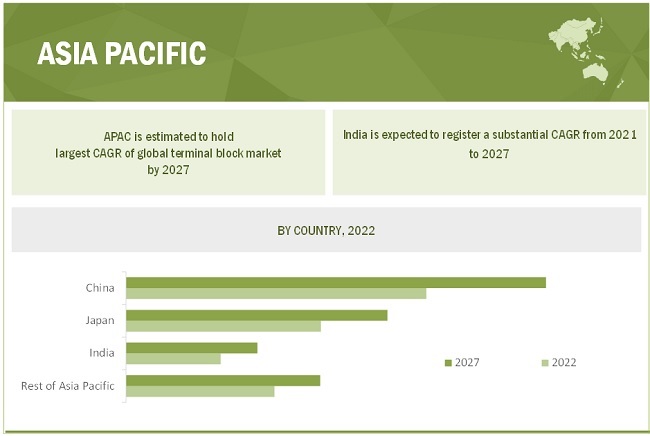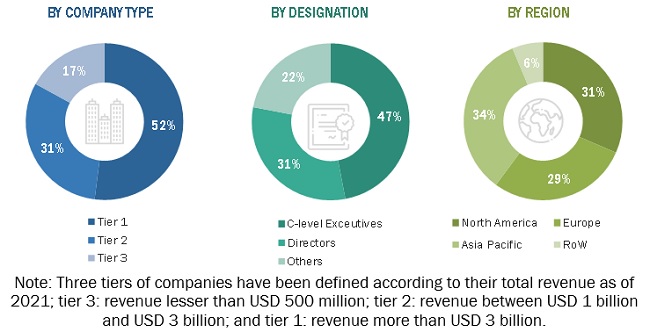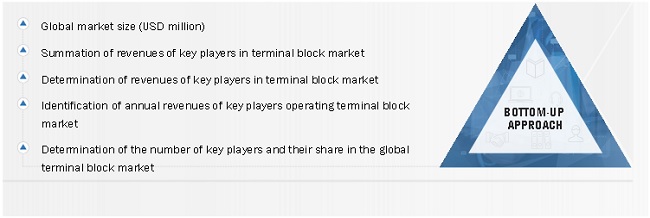Terminal Block Market by Type (Barriers or Barrier Strips, Sectional Terminal Blocks, PCB Mount Terminal Blocks, Power Terminal Blocks), Industry (HVAC Systems, Industrial Controls, Process Control Instruments) - Global Forecast to 2027
Updated on : September 23, 2024
The terminal block market is witnessing strong demand, driven by its widespread application in industrial automation, electrical distribution, transportation, and energy sectors. Terminal blocks are critical components used for safe and efficient electrical connections, particularly in control systems and complex wiring configurations. Key trends propelling market growth include the increasing adoption of automation in manufacturing and energy sectors, the expansion of renewable energy projects, and the growing need for reliable and compact electrical components in modern infrastructure. Additionally, advancements in terminal block technology, such as push-in connection systems that enhance ease of installation and maintenance, are further boosting their demand. As industries focus on improving operational efficiency and safety in electrical systems, the terminal block market is expected to continue its upward trajectory.
Terminal Block Market Size & Growth
The global terminal block market size is estimated to be USD 3.9 billion in 2022 and projected to reach USD 5.2 billion by 2027, growing at a CAGR of 5.7% during the forecast period from 2022 to 2027.
The higher adoption of terminal blocks in telecom sector as well as PCB terminal blocks in various industries is driving the growth of the terminal block market. Moreover, increasing advancement in the connection technologies and growing need for micro-miniature terminal blocks due to space constraint in various equipment is also expected to drive the growth of the market in the near future.

To know about the assumptions considered for the study, Request for Free Sample Report
Terminal Block Market Trends and Dynamics
DRIVERS: Ongoing advancements in connection technologies
Advancements have been observed in connection technologies in the last few years. Previously, screw-type technology was used in all types of terminal blocks. In this type of connection, users had to ensure a long-lasting connection, which was time-consuming. Screw terminals posed installation challenges, and there was also a risk of loosening wires over time. Most terminal blocks possess nearly 8 to 10 poles on average, and several terminal blocks may be in a single assembly. It takes much time for a user to unscrew and screw each connection during installation or maintenance. As a result, various versions of connection technologies evolved; for example, push-in connection technology and insulation-displacement connection (IDC).
RESTRAINT: Difficulty in selecting right terminal block according to applications
A terminal block enables connectivity between multiple wires and circuits, and the connections are enclosed in an insulated housing. It is the backbone of automation and electrical control systems. Since terminal blocks are used in various applications, such as industrial controls, lighting controls, and power distribution systems, they come with different types of wire termination connections. Similarly, terminal blocks that find applications in power supplies, HVAC systems, signal transmissions systems, etc., require different types of terminal connections, such as screw-type, spring cage, insulation displacement connection, and cable lugs and connectors.
OPPORTUNITIES: Rapid urbanization and industrialization in developing countries
Urbanization is a new trend witnessed across the world. According to the United Nations data (2018), the growing population and increasing urbanization are projected to add 2.5 billion people to the world's urban population by 2050, with nearly 90% of the increase concentrated in Asia and Africa. It would eventually impact the terminal block market. Rapid industrialization and factory automation have been observed in developing countries in the last few years. This is because developed countries outsource their production task to developing countries since the cost of production in the developing countries is very low.
CHALLENGES: Difficulties in disposing of terminal block
Surface-mount technology (SMT) is a method for producing electronic circuits in which components are mounted or placed directly on the surface of printed circuit boards (PCBs). An electronic device powered by SMT is called a surface-mount device (SMD). SMT uses an assembly process wherein the components are joined on the surface of the board rather than inserted into holes running through the board. In the industry, through-hole technology for fitting components with wire is replaced with SMT. The manufacturing process for SMT is much more sophisticated than through-hole technology.
Terminal Block Market Segmentation
Sectional terminal blocks were the most extensively used terminal blocks in the market in 2021
The sectional terminal blocks segment holds the largest share of the terminal block market in 2021 and is expected to hold significant share during the forecast period. Advancements in NEMA and IEC DIN Rail sectional blocks have resulted in high adoption of these blocks in various applications such as construction, harsh environment, amusement park ride controls, discrete manufacturing, conveyance lines, special machines, educational campuses, commercial office buildings, and building automation. Sectional blocks provide more terminations per linear foot, fulfilling industry’s demands for the maximum number of terminations in a control panel.
Process control instruments industry to hold significant growth rate during the forecast period
Rapid industrialization and increased adoption of automation and instrumentation tools in process plants are the driving factors. Increased installation of terminal blocks in process monitoring and control instruments that find applications in process industries such as oil & gas and chemicals and rapid industrialization spur the growth of the terminal block industry.
Terminal Block Industry Regional Analysis
Asia Pacific is expected to be the leading region in the terminal block market during the forecast period
Asia Pacific accounted for a share of more than 30% of the terminal block market and is expected to witness the highest CAGR during the forecast period. Increased industrialization in the region, particularly in developing countries such as China, India, and Indonesia, is the major factor boosting the market growth. Further, it helps avoid non-compliance with strict environmental laws in developed countries, build good ties with other countries, and get market access. The strong focus of regional companies from the consumer electronics and automotive sectors to produce reliable and quality products using automation tools creates the need for terminal blocks for several applications in these sectors.

To know about the assumptions considered for the study, download the pdf brochure
Top Terminal Block Companies - Key Market Players
The terminal block companies is dominated by a few globally established players such as
- WAGO Kontakttechnik GmbH & Co. KG (Germany),
- TE Connectivity (Switzerland),
- Weidmüller Interface GmbH & Co. KG (Germany).
Terminal Block Market Report Scope
|
Report Metric |
Details |
| Estimated Market Size | USD 3.9 billion |
| Projected Market Size | USD 5.2 billion |
| Growth Rate | CAGR of 5.7% |
|
Market Size Available for Years |
2018–2027 |
|
Base Year |
2021 |
|
Forecast Period |
2022–2027 |
|
Units |
Value (USD Million/Billion) |
|
Segments Covered |
Type, Industry, Classification of Terminal Blocks According to their Structure, Function Type, and Connection Type; Mounting Type |
|
Geographic Regions Covered |
North America, Europe, Asia Pacific, and Rest of the World |
|
Companies Covered |
Major Players: WAGO Kontakttechnik GmbH & Co. KG (Germany), TE Connectivity (Switzerland), Weidmüller Interface GmbH & Co. KG (Germany), OMRON Corporation (Japan), Eaton Corporation (Ireland), PHOENIX CONTACT (Germany), Rockwell Automation, Inc. (US), Molex, LLC (US), Wieland Electric GmbH (Germany), among others - total 25 players have been covered |
This research report segments the terminal block market share based on type, industry, classification of terminal blocks according to their structure, function type, and connection type; mounting type, and region.
By Type:
- Barriers or Barrier Strips
- Sectional Terminal Blocks
- PCB Mount Terminal Blocks
- Power Terminal Blocks
- Others
By Industry:
- Business Equipment
- HVAC Systems
- Power Supplies
- Industrial Controls
- Process Control Instruments
- Telecom Equipment
- Transportation
- Others
By Classification of Terminal Blocks According to Structure, Function Type and Connection Type
-
Classification of Terminal Blocks According to Structure, Function Type
- Single Feed Through Terminal Blocks
- Double Level Terminal Blocks
- Three Level Terminal Blocks
- Ground Circuit Terminals
- Disconnect/Knife-Disconnect/Switch Terminal Blocks
- Fuse Terminal Blocks
- Thermocouple Blocks
- I/O Blocks
- Sensor-Specific Terminal Blocks
-
Terminal Blocks Based on Connection Type
- Spring (Cage Clamp) Type Terminal Blocks
- Screw-Type Terminal Blocks
- Insulation Displacement Connection-Type Terminal Blocks
- Push-In Type Terminal Blocks
- Special Connections
By Mounting Type
-
DIN Rail
- Miniature Top-Hat Rails
- G32 Rails
- Top-Hat Rails
- PCB Mount
- By Region:
- North America
- Europe
- Asia Pacific (APAC)
- Rest of the World (RoW)
Recent Developments in Terminal Block Industry
- In August 2021, TE Connectivity added Board mount reflow terminal blocks in its PCB terminal blocks portfolio. It provides a compact application solution for the warehouse automation market with limited space.
- In January 2021, Weidmüller Interface GmbH & Co. KG has announced the invention of RoCkStar ModuPlug terminal block modules with PUSH IN connection technology. The terminal solution in the connector frees up space in the cabinet and reduces the time needed for installation.
- In March 2020., WAGO Kontakttechnik GmbH & Co. KG expanded its product portfolio by launching the new TOP JOB S Rail-mount terminal blocks with levers and a cross-section of 4 mm².
Frequently Asked Questions (FAQ):
What is the total CAGR expected to be recorded for the terminal block market size during 2022-2027?
The global terminal block market is expected to record a CAGR of 5.7% from 2022–2027.
What are the driving factors for the terminal block?
Surging demand for PCB terminal blocks from various industries, ongoing advancements in connection technologies, growing implementation of advanced terminal blocks in telecom sector, and rising adoption of electric vehicles.
Which are the significant players operating in the terminal block market share?
WAGO Kontakttechnik GmbH & Co. KG (Germany), TE Connectivity (Switzerland), and Weidmüller Interface GmbH & Co. KG (Germany) are some of the major companies operating in the terminal block market.
Which region will lead the terminal block market share in the future?
Asia Pacific is expected to lead the terminal block market during the forecast period. .
To speak to our analyst for a discussion on the above findings, click Speak to Analyst

TABLE OF CONTENTS
1 Introduction
1.1 Study Objectives
1.2 Terminal Block Market Definition & Scope
1.2.1 Inclusion & Exclusion
1.3 Study Scope
1.3.1 Markets Covered
1.3.2 Years Covered
1.4 Currency
1.5 Limitations
1.6 Stakeholders
1.7 Summary of Changes
2 Research Methodology
2.1 Research Data
2.1.1 Secondary & Primary Research
2.1.2 Secondary Data
2.1.3 Primary Data
2.1.3.1 Primary interviews with experts
2.1.3.2 Key data from primary sources
2.1.3.3 Key industry insights
2.1.3.4 Breakdown of primaries
2.2 Market Size Estimation
2.2.1 Bottom-up Approach
2.2.2 Top-down Approach
2.3 Market Breakdown & Data Triangulation
2.4 Research Assumptions
2.5 Risk Assessment
3 Executive Summary
3.1 Realistic Scenario
3.2 Pessimistic Scenario
3.3 Optimistic Scenario
4 Premium Insights
5 Market Overview
5.1 Introduction
5.2 Market Dynamics
5.2.1 Drivers
5.2.2 Restraints
5.2.3 Opportunities
5.2.4 Challenges
5.3 Value Chain Analysis
5.4 Ecosystem
5.5 Pricing Analysis
5.5.1 Average Selling Price of Key Players
5.6 Trends/Disruptions impacting customer’s business
5.7 Technology Analysis
5.8 Porter Five Force Analysis
5.9 Key Stakeholders & Buying Criteria
5.10 Case Study Analysis
5.11 Trade Analysis
5.12 Patent Analysis
5.13 Key Conferences & Events in 2022-2023
5.14 Tariff and Regulatory Landscape
5.14.1 Regulatory Bodies, Government Agencies, And Other Organizations
5.14.2 Regulations and Standards
6 Classification of Terminal Blocks According to Structure, Function Type and Connection Type (Qualitative Segment)
6.1 Introduction
6.2 Classification of Terminal Blocks According to Structure, Function Type
6.2.1 Single-level Feed Through Terminal Blocks
6.2.2 Double-level Terminal Blocks
6.2.3 Three-level Terminal Blocks
6.2.4 Ground Circuit Terminals
6.2.5 Disconnect/Knife-Disconnect/Switch Terminal Blocks
6.2.6 Fuse Terminal Blocks
6.2.7 Thermocouple Blocks
6.2.8 I/O Blocks
6.2.9 Sensor-Specific Terminal Blocks
6.3 Terminal Blocks Based on Connection Technologies
6.3.1 Spring (Cage Clamp) Type Terminal Blocks
6.3.2 Screw-Type Terminal Blocks
6.3.3 Insulation Displacement Connection-Type Terminal Blocks
6.3.4 Push-In Type Terminal Blocks
6.3.5 Special Connections (Slip-On Plug-In Connection, TERMI-POINT Connection)
7 Terminal Block Market, Mount type (Qualitative Segment)
7.1 Introduction
7.2 DIN Rail
7.2.1 Miniature Top-Hat Rails
7.2.2 G32 Rails
7.2.3 Top-Hat Rails
7.3 PCB Mount
8 Terminal Block Market, By Type
8.1 Introduction
8.2 Barriers or Barrier Strips
8.3 Sectional Terminal Blocks
8.4 PCB Mount Terminal Blocks
8.5 Power Terminal Blocks
8.6 Others
9 Terminal Block Market, By Industry
9.1 Introduction
9.2 Business Equipment
9.3 HVAC (Heating, Ventilation, and Air Conditioning) Systems
9.4 Power Supplies
9.5 Industry Controls
9.6 Process Control Instruments
9.7 Telecom Equipment
9.8 Transportation
9.9 Others
10 Geographical Analysis
10.1 Introduction
10.2 North America
10.2.1 US
10.2.2 Canada
10.2.3 Mexico
10.3 Europe
10.3.1 UK
10.3.2 Germany
10.3.3 France
10.3.4 Rest of Europe
10.4 APAC
10.4.1 China
10.4.2 Japan
10.4.3 India
10.4.4 Rest of Asia Pacific
10.5 Rest of the World
10.5.1 Middle East & Africa
10.5.2 South America
11 Competitive Landscape
11.1 Introduction
11.1.1 Revenue Analysis of Top 5 Companies
11.2 Market Share Analysis of Top 5 Players, 2021
11.3 Company Evaluation Quadrant, 2021
11.3.1 Stars
11.3.2 Emerging Leaders
11.3.3 Pervasive
11.3.4 Participants
11.4 Small and medium Enterprises (SME) Evaluation Quadrant, 2021
11.4.1 Progressive Companies
11.4.2 Responsive Companies
11.4.3 Dynamic Companies
11.4.4 Starting Blocks
11.5 Terminal Block Market: Company Footprint
11.6 Competitive Benchmarking
11.7 Competitive Situation and Trends
11.7.1 Product Launches and Developments
11.7.2 Deals
12 Company Profiles
(Business Overview, Products Offered, MnM Viewpoint)
12.1 Key Players
12.1.1 Rockwell Automation, Inc
12.1.2 TE CONNECTIVITY LTD
12.1.3 Phoenix contact GmbH & CO.KG.
12.1.4 Weidmüller Interface GmbH & Co. KG
12.1.5 Wieland Electric GmbH
12.1.6 Weco Electrical Connectors Inc
12.1.7 WAGO Kontakttechnik GmbH & Co. KG
12.1.8 NINGBO DEGSON ELECTRICAL CO., LTD.
12.1.9 Eaton Corporation PLC
12.1.10 Siemens AG
12.1.11 MOLEX, LLC
12.1.12 OMRON Corporation
12.1.13 Advantech
12.1.14 IDEC CORPOATION
12.1.15 Amphenol-Anytek
12.2 Other Players
12.2.1 METZ Connect
12.2.2 CONTA-CLIP Verbindungstechnik GmbH
12.2.3 Cabur
12.2.4 Klemsan
12.2.5 Penn Union Corporation
12.2.6 Autonics Corporation
12.2.7 CHINT
12.2.8 Renhotec Group
12.2.9 Littlefuse, Inc
12.2.10 CUI Devices
12.2.11 Connectwell Industries Pvt. Ltd.
12.2.12 Dinkle International Co., Ltd.
12.2.13 Legrand
12.2.14 UPUN Electric
12.2.15 Elmex Controls Pvt. Ltd.
12.2.16 Ningbo SUPU Electronics Co., Ltd.
12.2.17 Chengdu Reliance Electric Co., Ltd.
13 Adjacent Market
14 Appendix
14.1 Discussion Guide
14.2 Knowledge Store: MarketsandMarkets’ Subscription Portal
14.3 Available Customizations
14.4 Related Reports
14.5 Author Details
Note: The above-mentioned table of content is tentative, and we may change the content as we proceed in research.
The study involved four major activities in estimating the current size of the terminal block market. Exhaustive secondary research has been done to collect information on the market, peer market, and parent market. To validate these findings, assumptions, and sizing with industry experts across the value chain through primary research has been the next step. Both top-down and bottom-up approaches have been employed to estimate the complete market size. After that, market breakdown and data triangulation methods have been used to estimate the market size of segments and subsegments.
Secondary Research
In the secondary research process, various secondary sources have been referred for identifying and collecting information important for the terminal block market study. Secondary sources include corporate filings (such as annual reports, investor presentations, and financial statements); trade, business, and professional associations; white papers, and certified publications; articles from recognized authors; directories; and databases.
Primary Research
In the primary research process, various primary sources from both the supply and demand sides have been interviewed to obtain qualitative and quantitative information for this report. Primary sources from the supply side include industry experts, such as CEOs, VPs, marketing directors, technology and innovation directors, and related key executives from major companies and organizations operating in the terminal block market. Following is the breakdown of primary respondents:

To know about the assumptions considered for the study, download the pdf brochure
Market Size Estimation
Both the top-down and bottom-up approaches have been used to estimate and validate the size of the overall terminal block market based on segments. The research methodology used to estimate the market size has been given below:
- Key players operating in the terminal block market have been identified through extensive secondary research.
- The industry’s supply chain and market size, in terms of value, have been determined through primary and secondary research processes.
- All percentage shares, splits, and breakdowns have been determined by using secondary sources and verified through primary sources.
Global terminal block market Size: Bottom-Up Approach

To know about the assumptions considered for the study, Request for Free Sample Report
Data Triangulation
After arriving at the overall terminal block market size—using the estimation processes explained above—the market has been split into several segments. To complete the overall market engineering process and arrive at the exact statistics of each market segment and subsegment, the data triangulation and market breakdown procedures have been employed, wherever applicable. The data has been triangulated by studying various factors and trends in both the demand and supply sides of the terminal block market.
Report Objectives:
- To describe and forecast the terminal block market, in terms of value, based on type and industry.
- To forecast the market size, in terms of value, for four main regions—North America, Europe, Asia Pacific (APAC), and Rest of the World (RoW)
- To provide detailed information regarding the drivers, restraints, opportunities, and challenges influencing the growth of the market
- To provide a comprehensive overview of the value chain of the terminal block ecosystem
- To strategically analyze micromarkets1 with respect to individual growth trends, prospects, and contributions to the total market.
- To strategically profile key players and comprehensively analyze their market position in terms of ranking and core competencies2 and provide a detailed competitive landscape of the market.
- To analyze opportunities in the market for stakeholders by identifying high-growth segments of the terminal block.
- To analyze competitive strategies, such as product launches and acquisitions, adopted by key market players in the terminal block market.
Available Customizations
Based on the given market data, MarketsandMarkets offers customizations in the reports according to the client’s specific requirements. The available customization options are as follows:
Company Information
- Detailed analysis and profiling of additional market players (up to 5)



 Generating Response ...
Generating Response ...











Growth opportunities and latent adjacency in Terminal Block Market
Would like to know market share and trends for the next 5 years in field of electrical connecters and terminal blocks. Purpose of this is to align my sourcing strategy globally for future.
My company has access to all relevant reports for our business published by a 8–9 year old research firm. The updated reports about the terminal block market are supposed to be published yet. I wonder what the main differences will be and what further insights your report will deliver? How often is this report been updated?
We are manufacturers of terminals blocks in Argentina and we would like to know technological trends of the family of products, units sold in different markets, ranking of manufacturers by region, prices by region, etc.
I am interested in the phoenix terminal market in India for DCS.
I'm interested to have a detailed report on global control panels terminal blocks market. How big is the market for industrial Control Panels?
We are looking for Terminal Block Market data specifically for 2019 with forecasts up to 2025. Further, we would like to have a overview on global Industries adopting terminal block, key Strategies adopted by the vendors in the market, segmentation on the basis of type (barrier strips, sectional terminal blocks, PCB mount terminal blocks, Power terminal block, Historical Analysis, and growth opportunities.